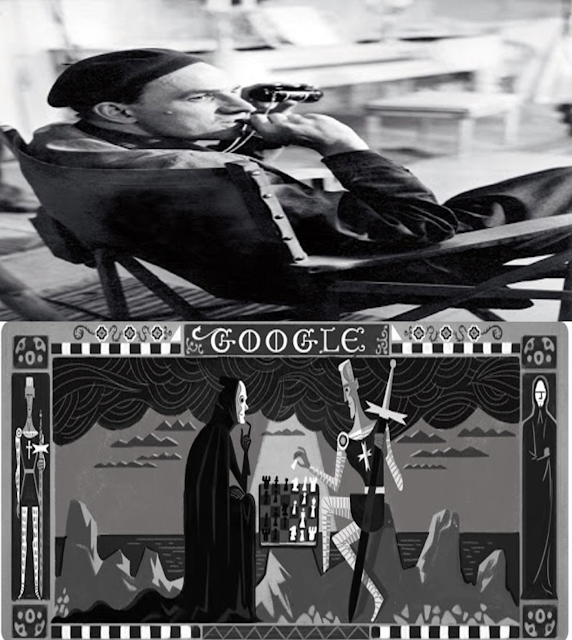Happy Birthday, Ingmar Bergman! Born today in 1918 as Ernst Ingmar Bergman, this Swedish screenwriter, producer and director had worked in film, television, theatre, and radio.
Bergman had directed over sixty films and documentaries for cinematic release and for television screenings, most of which he also wrote. He also directed over one hundred and seventy plays.
Bergman eventually forged a creative partnership with Swedish cinematographers Gunnar Fischer and Svet Nykvist.
Among his credits of the early 1950s, German is best known for directing 1953 Swedish black and white drama/romance film Sommaren med Monika' ('Summer with Monika') and the 1955 Swedish black and white comedy/romance film 'Sommarnattens leende' ('Smiles of a Summer Night'). This was Bergman's only comedy.
Among his credits of the late 1950s, Bergman is best known for directing two films in the same year.
These were the 1957 Swedish black and white historical drama/fantasy film 'Det sjunde inseglet' ('The Seventh Seal') and the 1957 Swedish black and white drama/romance film 'Smultronstället' ('Wild Strawberries', which literally means "the wild strawberry patch").
The former film is considered a classic of world cinema, as well as one of the greatest movies of all time.
It had established Bergman as a world-renowned director, containing scenes which have become iconic through homages, critical analysis, and parodies.
The latter film featured pioneering Swedish film director, screenwriter, and actor Victor Sjöström ('The Phantom Carriage') in his last feature appearance.
Sjöström was Sweden's most prominent director in the "Golden Age of Silent Film" in Europe. It was his work that had later inspired Bergman's filmography.
Among Bergman's credits of the early 1960s (aside from 'Through a Glass Darkly'), Bergman is best known for directing the 1963 Swedish black and white drama film 'Nattvardsgästerna ('Winter Light', lit. 'The Communicants'). The film was the second installment of his Silence Trilogy.
Most of Bergman's films were set in Sweden, and many films were shot on the island of Fårö. This is an island of mainland Sweden's southeastern coast in the Baltic Sea.
One of his films shot there was his 1961 Swedish black and white drama/family drama onward 'Såsom i en spegel' ('Through a Glass Darkly', lit. 'As in a Mirror'). The film was the first installment of Bergman's Silence Trilogy.
Of the late 1960s, Bergman is best known for directing the 1966 Swedish black and white psychological drama/mystery film 'Peronsa'.
Two years late, Bergman direct two films in the same year. These were the 1968 Swedish black and white 1968 psychological horror film ' Vargtimmen' (lit. 'The Wolf Hour' or 'Hour of the Wolf') and the 1968 Swedish black and white war/drama film 'Skammen' ('Shame'). The former was Bergman's only horror film.
Among his credits of the 1970s, 'Bergman is best known for directing the 1972 Swedish historical period drama film 'Viskningar och rop' (lit. 'Whispers and Cries' or 'Cries and Whispers').
Among his credits of the 1980s, Bergman is best known for directing his swan song. This was the 1982 Swedish/French/West German historical drama/fantasy film 'Fanny och Alexander' ('Fanny and Alexander').
With a runtime of three hours, the television miniseries had a runtime of five hours.
In 2005 TIME magazine had ranked ‘Smiles of a Summer Night’ as one of the 100 Greatest Films since 1923.
On July 30, 2007, Bergman passed from natural causes in Fârō, Sweden. He was 89.
English film critic and radio producer Philip French referred to Bergman as "one of the greatest artists of the 20th century ... he found in literature and the performing arts a way of both recreating and questioning the human condition."
Martin Scorsese had also commented: "If you were alive in the 50s and the 60s and of a certain age, a teenager on your way to becoming an adult, and you wanted to make movies, I don't see how you couldn't be influenced by Bergman ....It's impossible to overestimate the effect that those films had on people."
One of the most revelatory voices to emerge from the postwar explosion of international art-house cinema, Bergman was a master storyteller who startled the world with his stark intensity and naked pursuit of the most profound metaphysical and spiritual questions.
The struggles of faith and morality, the nature of dreams, and the agonies and ecstasies of human relationships—Bergman explored these subjects in films ranging from comedies whose lightness and complexity belie their brooding hearts to groundbreaking formal experiments and excruciatingly intimate explorations of family life.
On July 14, 2013, a Google Doodle was created for what would have been Bergman's 95th birthday.
Also known as Buntel Eriksson, Bergman had been active from 1944–2005.
#borntodirect
@Criterion
@tcm
@Kanopy
@nytimes
@time
@newyorker
@indiewire
@GoogleDoodles
@Britannica

No comments:
Post a Comment